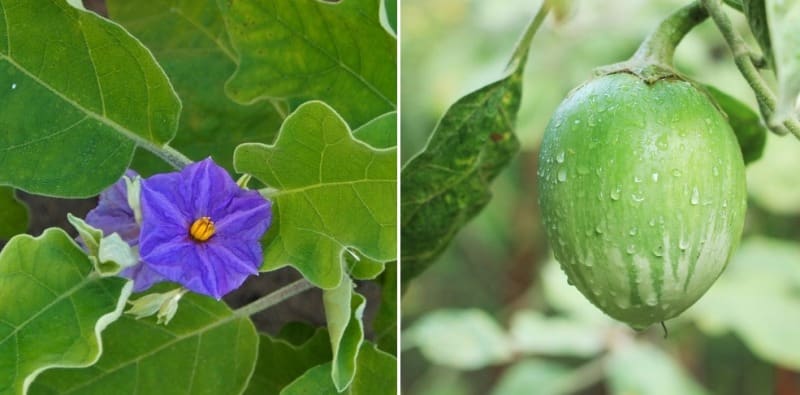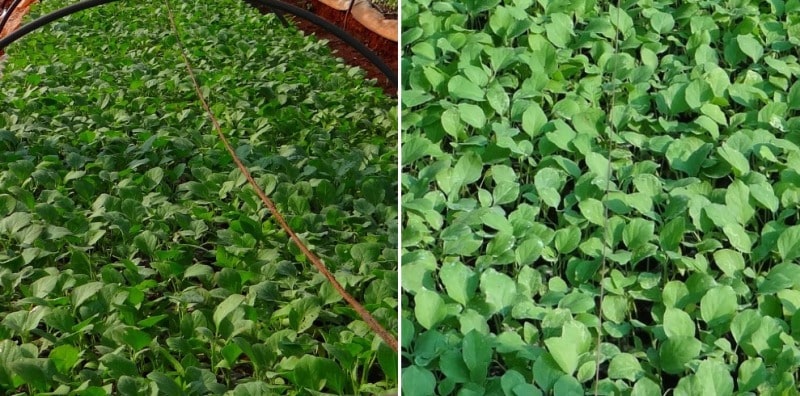A step by step guide to Eggplant farming in polyhouse
Today, we are into the discussion of Eggplant farming in polyhouse which covers from seedling production to harvesting in the controlled environmnet. Eggplant or venkayaor brinjal is one of the most common tropical vegetables grown in India. It is also known as different names like Begun, baingan, badane, waangum, vange, baigan, Vashuthana, Kathiri, venkaya, and Peethabhala.
Eggplant, also known as egg-plant or poor man’s crop and is a very popular vegetable grown in almost all over the world. Eggplant is perennial but grown commercially as an annual crop. Eggplant is a popular polyhouse crop due to the high yield potential, rapid growth, and improved quality possible over a longer season. A strong, vegetative growth habit makes Eggplant fairly adaptable to a range of growing conditions. Polyhouse growing maximizes production by growing the crop fast at a high temperature and high planting density.
Varieties of Eggplant:
Some varieties of Eggplant are given below;
Round: Pusa Purple Round, Pant Rituraj, ArkaNavneet
Long: Megha Eggplant-l (RCMBL-l), Pusa Purple Long, PusaPurple Cluster, Pusa Kranti, ArkaSheel, Pant Sarnrat, Punjab Sadabahar, MeghaEggplant- 3 (RCMBL – 3)
Medium: Megha Eggplant- 2 (RCMBL- 2).
Sharapova and Fantastic are among the F1 hybrids which can be grown successfully in polyhouse structures such as walk-in tunnels and naturally ventilated polyhouses.

Importance of polyhouse farming:
In Polyhouse vegetable farming, we can protect our crops from any adverse environment such as high humidity or high temperature. There is a capability in Polyhouse to control temperature or humidity. There will be an increase in the production of vegetables in Polyhouse farming without losing their color and quality.
Polyhouse farm can protect the crops by preventing the entry of animals and birds into the farm. When we cultivate in the normal farm, nearly 1/3rd of the crops can be lost due to the attack of insects and worms, whereas in Polyhouse farming, we can harvest the crops about three to five times more without much damage or loss.
One of the major reasons for the decrease in agriculture in India nowadays is no availability of enough agricultural lands. But the invention of Polyhouse is a result of lack of agricultural lands. We can obtain more crops from less space in Polyhouse farming. The Polyhouse is made in such a way that it can give water and fertilizers in required amounts in a controlled manner which can result in high yields.
Climate requirement for Eggplant farming:
Eggplant is a warm-season crop and it requires a long warm growing season and it is susceptible to frost. A daily mean temperature range of 13-21°C is most favorable for its successful production. The growth of the Eggplant crop is severely affected when the temperature falls below 17°C.
Soil requirement for Eggplant farming in polyhouse:
In polyhouse, Eggplant can be grown practically on all type of soils from light sandy to heavy clay. Silt loam and clay loam soils are normally preferred. The soil must be deep, fertile, well-drained and pH should be 5.5-6.8.
You should not miss the Garlic Cultivation Income, Cost, Project Report.
Seed treatment in Eggplant farming:
Seed treatment with Trichoderma viridae or T. harzianum @ 2g /100 g of seeds to prevent seed and soil-borne infection of fungal diseases. Or
Treat the Eggplant seeds with (Carboxyn 37.5% + Thiram 37.5%) DS @ 1.5g or (Carbendazim 1.0g + Thiram 1.5g)/ kg of seeds.
Eggplant seed sowing:
Seeds are sown in bed and transplanted to the main field after four weeks during summer and after 7 to 8 weeks during winter, when it is 8 – 10 cm tall. Depending on the growth of varieties and seasons of cultivation, several seeds are selected. Since Eggplant seedlings grow fast, sufficient care should be taken to sow seeds as thin or loose as possible. Hardened seedlings withstand transplanting shock better and establish well in a major field.
Seedling production in Eggplant farming in polyhouse:
Transplants are generally used to establish a uniform and complete stand of plants. Transplants developed in cells or containers are ideal because they allow field planting without disturbing the root system. Plug trays or containers are filled with a sowing medium such as peat moss, commercial potting soil, or a potting mix arranged from a combination of soil, compost, rice hulls, vermiculite, peat moss, and sand. Sterilize the soil mixture by autoclaving or baking at 150°C for two hours.

Plug seedlings are developed under polyhouse conditions. Fertilize seeds weekly after 2 weeks, preferably with a water-soluble fertilizer solution. Seedlings will be ready to set in the field 4 to 5 weeks after sowing. Seeds can also be sown in seedling beds. The seedbeds must be fertile and well-drained. The seedling bed area can be incorporated with fertilizers ammonium sulfate, superphosphate, potassium chloride, and compost. Apply a thin layer of compost on the seedbed before mulching with rice straw and cover them with a mesh screen net. Thin seedlings at the first true leaf period. They will be ready for transplanting in 5 to 6 weeks after sowing.
Transplanting and spacing in Eggplant farming:
The seedlings are ready for transplanting 35 to 40 days after seed sowing when they attain a height of 15 cm with 4-5 leaves. Usually, the spacing for the bushy non-spreading type must be 50-60 cm in both the ways and for spreading varieties row to row distance should be 75 to 90 cm and plant to plant distance must be 60 to 70 cm. planting is done preferably in the evening time. Irrigation will be done immediately after transplanting.
Fertility of Soil:
For growing in soil, perform a soil test using the saturated media extract test designed specifically for polyhouse growing, and amend to the recommendations provided. If you are growing a long-term crop that will be in the ground for 4 months or more will not be able to provide all the necessary nutrients from pre-planting fertility. Side dressing or fertigating with extra nutrients will be required. Use plant tissue testing to monitor the health of the plants and add extra nutrients when necessary.
You may also like the Tomato Farming in Polyhouse for Profit.
Irrigation requirement for Eggplant farming in polyhouse:
Continuous supply of moisture must be maintained around the root zone of the plant. Light irrigation is given on the first day and the third day after transplanting. Thereafter irrigation is given at an interval of 8 to 10 days during winter and 5-6 days during summer.
Drip irrigation proves to be helpful for Eggplant cultivation in polyhouse. One particular system that can increase efficiency in multiple ways is a drip irrigation system.
Drip irrigation systems are horticultural watering systems that localize the watering (and fertilization) method to provide a precise amount of water (and nutrients) directly to the root zone of the plants. The main benefits to drip irrigation systems include less water loss during irrigation, more control over “zones” in the polyhouse or field, and precise watering and fertilizing that can be tailored to a specific crop or a specific stage of growth.
Though Eggplant cannot tolerate waterlogging, timely irrigation is essential for fruit set and development. In plains, irrigation is required at every third or fourth day during summer while in winter it should be at 10-15 days interval. During winter, care must be taken to keep the soil moist to avoid crop loss due to frost injury. Being a row planted a crop, a drip irrigation system is advantageous and water used in drip irrigation is only 24.47 cm compared to 69.18 cm under the furrow method.
Irrigation is essential for Eggplant cultivation wherever little or no rain is available during the growing season. The irrigation system is most critical during the time of flowering and fruit set. A lack of water during this period could lead to the growth of blossom end rot and malformed fruit. Reduction of fruit size and yield are caused by moisture stress.
Wilting during the late morning is a good indication that the crop needs an irrigation system. Eggplant is a medium-rooted crop with a root zone depth of 90 cm in well-drained soil. The process of irrigation depends on soil texture, topography, and water supply. Generally, furrow or surface irrigation and drip irrigation systems are used. Also, mulching with black plastic will keep more uniform soil moisture between irrigations.
Plant protection measures:
Bacterial wilt: Seed treatment with Bavistin@ 2 g/kg of seed or apply bleaching powder @ 15 kg/ha in the field before one month of transplanting. Use crop rotation with non-solanaceous crops particularly with cole crops.
Phomopsis blight: Seed treatment with hot water for 30 minutes or Captan/ Thiram@ 3g/kg of seeds. Seedlings must be dipped in Bavistin @ 2 g/l of water for 15 minutes before transplanting. Apply 1 % Bordeaux mixture in standing crop. Follow crop rotation by non-solanaceous crops.
Fruit &shoot borer: Remove the infected fruits and shoots and burn them in the soil surface. Apply 2 to 3 sprays of Monocrotophosor Rogor @ 1.5 ml/liter of water at the time of flowering.
Eggplant harvesting in polyhouse:
Eggplant fruits are harvested at an immature stage after attaining full-size fruit, but before losing its glossy appearance. The dullness of Eggplant fruit indicates over maturity. Usually, Eggplant fruits are harvested along with its stalk with a slight twist by hand. In some varieties, a sharp knife is used for harvesting fruits along with fleshy calyx and a portion of fruit stalk. The harvested Eggplant fruits are graded and packed in baskets or loose gunny bags. Care must be taken to remove the fruits affected by Phomopsis blight.
You may be interested in Moringa Plantation, Care, Harvesting.
I want to learn brinjal farming in grow bag system in poly house, please tell me where can I get training for all with drip irrigation system